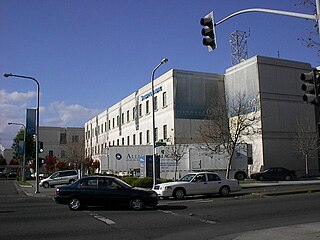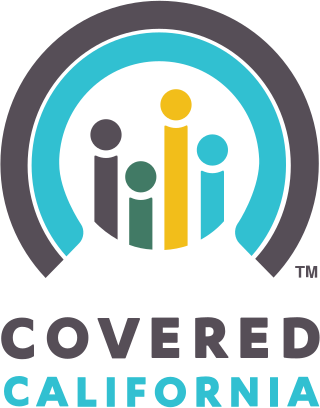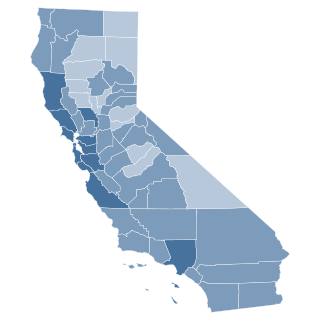
Gavin Christopher Newsom is an American politician and businessman serving since 2019 as the 40th governor of California. A member of the Democratic Party, he was the 49th lieutenant governor of California from 2011 to 2019 and the 42nd mayor of San Francisco from 2004 to 2011.

Forest Hill is a neighborhood in San Francisco, California. Forest Hill is one of eight master-planned residence parks in San Francisco. Forest Hill is located near the middle of the City of San Francisco, southeast of the Inner Sunset and northeast of West Portal. Boundaries are roughly Seventh Avenue/Laguna Honda Boulevard to the north and east, Taraval Street to the south, and 14th Avenue to the west.
The California Medical Assistance Program is the California implementation of the federal Medicaid program serving low-income individuals, including families, seniors, persons with disabilities, children in foster care, pregnant women, and childless adults with incomes below 138% of federal poverty level. Benefits include ambulatory patient services, emergency services, hospitalization, maternity and newborn care, mental health and substance use disorder treatment, dental (Denti-Cal), vision, and long-term care and support. Medi-Cal was created in 1965 by the California Medical Assistance Program a few months after the national legislation was passed. Approximately 15.28 million people were enrolled in Medi-Cal as of September 2022, or about 40% of California's population; in most counties, more than half of eligible residents were enrolled as of 2020.

The San Francisco Sheriff's Office (SFSO), officially the City and County of San Francisco Sheriff's Office, is the sheriff's office for the City and County of San Francisco. The current sheriff is Paul Miyamoto. The department has 850 deputized personnel and support staff. The SFSO is a separate organization from the San Francisco Police Department. However, SFSO deputies and SFPD officers have all attended a POST-mandated police academy, and are duly sworn California peace officers.

Kaiser Richmond Medical Center is a large Kaiser Permanente hospital in downtown Richmond, California which serves 77,000 members registered under its medical plans. It opened in 1995 replacing the historic 1942 Richmond Field Hospital that serviced Liberty shipyard workers and thus gave birth to the HMO. However it was deemed seismically unsafe and this new campus was built.

The Priscilla Chan and MarkZuckerberg San Francisco General Hospital and Trauma Center (ZSFG) is a public hospital in San Francisco, California, under the purview of the city's Department of Public Health. It serves as the only Level I trauma center for the 1.5 million residents of San Francisco and northern San Mateo County. It is the largest acute inpatient and rehabilitation hospital for psychiatric patients in the city. Additionally, it is the only acute hospital in San Francisco that provides 24-hour psychiatric emergency services.
University Preparatory Charter Academy, also known as "U-prep" or "UPREP", was a charter high school in the Oakland Unified School District, California. It was founded in 2001 by Isaac Haqq in the Eastmont Town Center at the corner of 72nd Street and Bancroft Ave. In its first year of operation, the school had about 80 students and taught a ninth grade curriculum, expanding in number of students and grade levels taught each year. The school doubled in size from some 130 to 260 students in 2004.
Healthy San Francisco is a health access program launched in 2007 to subsidize medical care for uninsured residents of San Francisco, California. The program's stated objective is to bring universal health care to the city. Healthy San Francisco is not a true insurance program, as it does not cover services such as dental and vision care, and only covers services received in the city and county of San Francisco. The program itself acknowledges its limitations, and has stated that "insurance is always a better choice." Healthy San Francisco represents the first time a local government has attempted to provide health insurance for all of its constituents. The program is open to low-income city residents over the age of 18 who do not qualify for other public coverage, and who have had no insurance for at least 90 days. Eligibility is not conditional on citizenship, immigration, employment or health status. The program covers a range of services, but only pays providers within San Francisco. By July 2010, almost 90% of the uninsured adults in San Francisco — over 50,000 people — had enrolled in Healthy San Francisco.
Isaac Haqq is an American businessman, educator, and former municipal politician.

Dennis Herrera is an American attorney, currently serving as Public Utilities Commission general manager for San Francisco. Herrera was previously City Attorney of San Francisco, known for his longtime legal advocacy for same-sex marriage in California, including the In re Marriage Cases, 43 Cal.4th 757 (2008), and Hollingsworth v. Perry, 570. U.S. (2013), as well as the legal fight against Proposition 8. He was first elected as City Attorney in 2001, and re-elected without opposition in 2005, 2009, 2013, 2015 and 2019. He ran unsuccessfully for Mayor of San Francisco in the 2011 election, finishing third in the City's ranked-choice voting system. After his long-standing position as City Attorney, he was unanimously approved in 2021 to become the general manager of the San Francisco Public Utilities Commission.

The June 2006 San Francisco general elections were held on June 6, 2006, in San Francisco, California. The elections included one seat to the San Francisco County Superior Court and four San Francisco ballot measures.

Eric Goosby is an American public health official, currently serving as the UN Special Envoy on Tuberculosis. Goosby previously served as the United States Global AIDS Coordinator from 2009 until mid-November 2013. In the role, Goosby directed the U.S. strategy for addressing HIV around the world and led President Obama's implementation of the President's Emergency Plan for AIDS Relief (PEPFAR). Goosby was sworn in during June 2009 and resigned in November 2013, taking a position as a professor at UCSF, where he directs the Center for Global Health Delivery and Diplomacy, a collaboration between UCSF and the University of California, Berkeley.

Scott Wiener is an American politician and a member of the California State Senate. A Democrat, he represents the 11th Senatorial District, encompassing San Francisco and parts of San Mateo County.

Ingleside Terraces is an affluent residential neighborhood of approximately 750 detached homes built at the former location of the Ingleside Racetrack in the southwestern part of San Francisco, California, United States. It is adjacent to the Balboa Terrace, Ingleside, Merced Heights and Lakeside neighborhoods, and is bordered by Ocean Avenue to the north, Ashton Avenue to the east, Holloway Avenue to the south and Junipero Serra Boulevard to the west. The main local event that occurs is the Annual Sundial Park Picnic, in which the local residents host bicycle, chariot, and wagon racing. There is a large sundial located on Entrada Court, surrounded by the oval-shaped Urbano Drive, which was once a horse race track. Ingleside Terraces is one of nine master-planned residence parks in San Francisco.

Rose Lan Pak was a political activist in San Francisco, California, noted for her influence on city politics and power in the Chinatown community. Pak served as a consultant for the San Francisco Chinese Chamber of Commerce and organizer of the Chinese New Year Parade in San Francisco.
Friends of Laguna Honda is a name used over the years by Laguna Honda Hospital Volunteers supporting Laguna Honda Hospital and Rehabilitation Center (LHH), a 62-acre skilled nursing and rehabilitation center owned and operated by the San Francisco Department of Public Health.

Doctors Medical Center was an eight-story, 120-bed public hospital in San Pablo, California which served 250,000 residents in western Contra Costa County from 1954 to 2015.

Covered California is the health insurance marketplace in the U.S. state of California established under the federal Patient Protection and Affordable Care Act (ACA). The exchange enables eligible individuals and small businesses to purchase private health insurance coverage at federally subsidized rates. It is administered by an independent agency of the government of California.
This article summarizes healthcare in California.

Proposition 52 is a California ballot proposition that passed on the November 8, 2016 ballot, regarding indefinitely extending an existing charge on hospitals to fund Medi-Cal health care services. The charge, called the "Hospital Quality Assurance Fee", has been collected since 2009 with temporary renewals and was scheduled to expire on January 1, 2018.
















